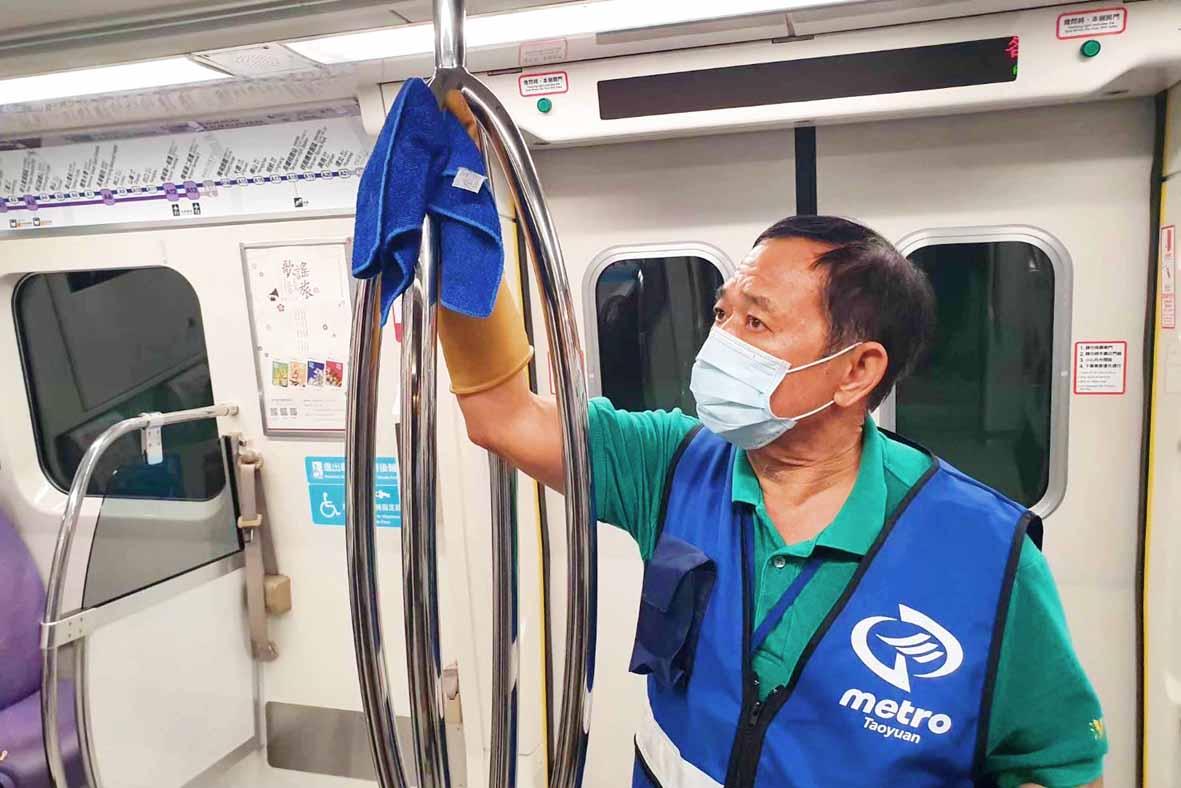The Taipei City Government yesterday announced that it would set up restricted areas in front of the center stage for its New Year’s Eve party, adding that it might take further measures to curb the spread of COVID-19, including only allowing a reduced audience.
The city government might stream the celebration on Thursday next week, to allow people to virtually participate, it said.
The city government would enforce the Central Epidemic Command Center’s (CECC) regulations, as announced by the center on Tuesday, and close disease prevention loopholes by setting up further restrictions at the event.

Photo courtesy of the Taiwan Taoyuan International Airport MRT
It would ask attendees to register with the organizers, the city government said.
The CECC tightened its disease prevention restrictions after a local contact of a pilot from New Zealand, who tested positive for COVID-19 on Sunday last week, also tested positive, making her Taiwan’s first domestic case of the novel coronavirus since April.
The restricted areas would be on Songgao Road, Songshou Road and in front of the Taipei City Council building, the city government said.
Each area would have up to 10 entry points each, depending on the size of the area, Taipei Department of Information and Tourism Commissioner Liu Yi-ting (劉奕霆) told a news conference.
The city government would enforce the wearing of masks, take people’s temperatures and request personal contact data, he added.
Should the central government implement stricter COVID-19 rules, it would hold the event without a live audience, but stream it online, Taipei Deputy Mayor Vivian Huang (黃珊珊) said, adding that it might also strictly restrict attendance to residents of the area around Taipei 101.
After New Taipei City on Wednesday announced the cancelation of all outdoor activities for the city’s annual Christmasland event, Taoyuan Mayor Cheng Wen-tsan (鄭文燦) and Taichung Mayor Lu Shiow-yen (盧秀燕) yesterday said that their respective city governments are not ruling out either streaming New Year’s Eve events online or canceling the events.

Taiwan has received more than US$70 million in royalties as of the end of last year from developing the F-16V jet as countries worldwide purchase or upgrade to this popular model, government and military officials said on Saturday. Taiwan funded the development of the F-16V jet and ended up the sole investor as other countries withdrew from the program. Now the F-16V is increasingly popular and countries must pay Taiwan a percentage in royalties when they purchase new F-16V aircraft or upgrade older F-16 models. The next five years are expected to be the peak for these royalties, with Taiwan potentially earning

POSITIVE DEVELOPMENT: Japan and the US are expected to hold in-depth discussions on Taiwan-related issues during the meeting next month, Japanese sources said The holding of a Japan-US leaders’ meeting ahead of US President Donald Trump’s visit to China is positive news for Taiwan, former Japan-Taiwan Exchange Association representative Hiroyasu Izumi said yesterday. After the Liberal Democratic Party’s landslide victory in Japan’s House of Representatives election, Japanese Prime Minister Sanae Takaichi is scheduled to visit the US next month, where she is to meet with Trump ahead of the US president’s planned visit to China from March 31 to April 2 for a meeting with Chinese President Xi Jinping (習近平). Japan and the US are expected to hold in-depth discussions on Taiwan-related issues during the

‘LIKE-MINDED PARTNER’: Tako van Popta said it would be inappropriate to delay signing the deal with Taiwan because of China, adding he would promote the issue Canadian senators have stressed Taiwan’s importance for international trade and expressed enthusiasm for ensuring the Taiwan-Canada trade cooperation framework agreement is implemented this year. Representative to Canada Harry Tseng (曾厚仁) in an interview with the Central News Agency (CNA) said he was increasingly uneasy about Ottawa’s delays in signing the agreement, especially as Ottawa has warmed toward Beijing. There are “no negotiations left. Not only [is it] initialed, we have three versions of the text ready: English, French and Mandarin,” Tseng said. “That tells you how close we are to the final signature.” Tseng said that he hoped Canadian Prime Minister Mark Carney

STAY IN YOUR LANE: As the US and Israel attack Iran, the ministry has warned China not to overstep by including Taiwanese citizens in its evacuation orders The Ministry of Foreign Affairs (MOFA) yesterday rebuked a statement by China’s embassy in Israel that it would evacuate Taiwanese holders of Chinese travel documents from Israel amid the latter’s escalating conflict with Iran. Tensions have risen across the Middle East in the wake of US and Israeli airstrikes on Iran beginning Saturday. China subsequently issued an evacuation notice for its citizens. In a news release, the Chinese embassy in Israel said holders of “Taiwan compatriot permits (台胞證)” issued to Taiwanese nationals by Chinese authorities for travel to China — could register for evacuation to Egypt. In Taipei, the ministry yesterday said Taiwan